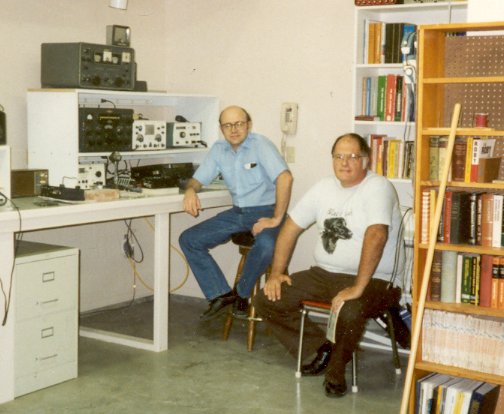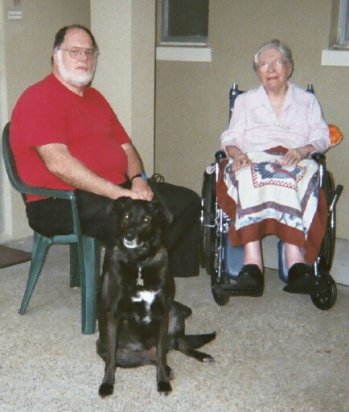
Last night I got word from Florida author Elenora Sabin that George Ewing had collapsed and died of a massive heart attack on May 18. He was 64. He had been in the parking lot near where he worked, in Tampa, Florida when the collapse occurred. Death was evidently immediate; by the time bystanders saw him and called 911, he was gone. I spoke with his brother Tom a little while ago. He mentioned that George had had an organ donation agreement in place through the LifeLink Foundation, and following organ donation, his body was cremated. His ashes are being returned to George’s home state of Michigan, where they will be interred in his parents Wilkin & June Ewing’s plot at Riverside Cemetery in Sault Ste. Marie. He never married, and is survived by his brother Tom. No memorial services are planned.
 I first ran into George at the Clarion SF Writers’ Conference in East Lansing, Michigan, in 1973. That’s him on the right margin of the photo at left, holding a camera. (The other two workshoppers shown are Alan Brennert, far left, and Seth MacEvoy, center. There’s a chap between Seth and George whom I don’t recognize.) As WN9MQY, I had thrown my novice ham station into the trunk of my Chevelle and taken it with me, imagining running a wire from a third-floor dorm room out to one of the campus’s abundant trees. No luck; we were in the basement of Mason-Abbot Hall, and the only thing outside my room window were yew bushes…and a copper downspout. Hmmm. I poked a run of coax out the window and ran around outside to see whether I could somehow match into the copper pipe…and found another piece of coax in the dirt, coming from the next window over from mine. That’s when I met George Macdonald Ewing WA8WTE. Neither of us ever got a good match into the downspout, but that was all right. He became a close friend and my staunchest ally at the conference (which was a continuous low-key war between the Techs and the Orteests) and we were never out of touch for long after that.
I first ran into George at the Clarion SF Writers’ Conference in East Lansing, Michigan, in 1973. That’s him on the right margin of the photo at left, holding a camera. (The other two workshoppers shown are Alan Brennert, far left, and Seth MacEvoy, center. There’s a chap between Seth and George whom I don’t recognize.) As WN9MQY, I had thrown my novice ham station into the trunk of my Chevelle and taken it with me, imagining running a wire from a third-floor dorm room out to one of the campus’s abundant trees. No luck; we were in the basement of Mason-Abbot Hall, and the only thing outside my room window were yew bushes…and a copper downspout. Hmmm. I poked a run of coax out the window and ran around outside to see whether I could somehow match into the copper pipe…and found another piece of coax in the dirt, coming from the next window over from mine. That’s when I met George Macdonald Ewing WA8WTE. Neither of us ever got a good match into the downspout, but that was all right. He became a close friend and my staunchest ally at the conference (which was a continuous low-key war between the Techs and the Orteests) and we were never out of touch for long after that.
 Like me, he was a hands-on techie and hard SF enthusiast, and we brainstormed SF ideas and critiqued one another’s fiction frequently both at Clarion and afterward, in letters (later electronically) and in person. He was encouraging but also honest: In 1977, while visiting us in Chicago, he persuaded me to abandon a novel I was working on, and kidded me goodnaturedly about some of its more juvenile aspects for years thereafter. He sent a newsletter/fanzine to our Clarion class for the rest of the 70s, run off on the ditto machine of the rural Michigan high school where he taught. Alas, the termites made a colony out of my box of fanzines and APAs in the late 90s, and they’ve all perished, but George’s Post-Clarion Carrion was nicely done and often hilarious, especially his off-the-wall SF movie reviews. He attended our wedding in 1976 (above) and we saw him at SF cons regularly over the years. He and I were among the founders of the SF/tech fan group General Technics, a group that persists to this day.
Like me, he was a hands-on techie and hard SF enthusiast, and we brainstormed SF ideas and critiqued one another’s fiction frequently both at Clarion and afterward, in letters (later electronically) and in person. He was encouraging but also honest: In 1977, while visiting us in Chicago, he persuaded me to abandon a novel I was working on, and kidded me goodnaturedly about some of its more juvenile aspects for years thereafter. He sent a newsletter/fanzine to our Clarion class for the rest of the 70s, run off on the ditto machine of the rural Michigan high school where he taught. Alas, the termites made a colony out of my box of fanzines and APAs in the late 90s, and they’ve all perished, but George’s Post-Clarion Carrion was nicely done and often hilarious, especially his off-the-wall SF movie reviews. He attended our wedding in 1976 (above) and we saw him at SF cons regularly over the years. He and I were among the founders of the SF/tech fan group General Technics, a group that persists to this day.
In the early 1970s he hand-built a plywood geodesic dome on some property he’d bought near Cheboygan, Michigan, and lived in the dome while slowly hand-building an A-frame chalet beside it. By 1980 the A-frame was livable (barely) and he convened a party to celebrate and dismantle the dome. Fifteen or twenty of us showed up, and the dome came down in high style. The A-frame wasn’t quite finished (interior walls had not yet been sheetrocked, which made for problems with the bathroom) but we had campfires and outings to Whitefish Bay and slept in a huge tent made of sheet plastic weighted at the edges with old railroad ties and inflated with an ordinary window fan.
 George was a published writer in both the SF and nonfiction worlds. His first story, “Black Fly,” appeared in Analog in September 1974, followed by semiregular publication there, in Asimov’s, and other places. He sold numerous articles into the electronics/ham radio market, many focused on scrounge technology. In 1983 Wayne Green Publications published George’s book Living on a Shoestring, which was a Ewing brain dump on how to do more with less and repurpose what you and I might call junk into the raw materials of a comfortable (if eccentric) life. It’s as close to a memoir as we’ll ever have, as those who knew him will attest. He was always doing this stuff, and developed a sense for outside-the-box make-do technology that served him well both personally and in his fiction. He was Pro Guest of Honor at Nanocon 8 in Houghton, Michigan, in 1996, and the Houghton SF group published a short reprint volume of his fiction for the con. He played tuba in his high-school band, and considered tuba one of his iconic traits. I never actually saw a tuba in his hands, but he drew cartoons of himself playing one on regular occasions–often standing atop unlikely things like abandoned military radar antennas.
George was a published writer in both the SF and nonfiction worlds. His first story, “Black Fly,” appeared in Analog in September 1974, followed by semiregular publication there, in Asimov’s, and other places. He sold numerous articles into the electronics/ham radio market, many focused on scrounge technology. In 1983 Wayne Green Publications published George’s book Living on a Shoestring, which was a Ewing brain dump on how to do more with less and repurpose what you and I might call junk into the raw materials of a comfortable (if eccentric) life. It’s as close to a memoir as we’ll ever have, as those who knew him will attest. He was always doing this stuff, and developed a sense for outside-the-box make-do technology that served him well both personally and in his fiction. He was Pro Guest of Honor at Nanocon 8 in Houghton, Michigan, in 1996, and the Houghton SF group published a short reprint volume of his fiction for the con. He played tuba in his high-school band, and considered tuba one of his iconic traits. I never actually saw a tuba in his hands, but he drew cartoons of himself playing one on regular occasions–often standing atop unlikely things like abandoned military radar antennas.
He spent a week with us in Rochester in the summer of 1982, and housebroke our new puppy Chewy while we were both away at work. Greater love hath no man…
 I don’t have many good pictures of George. What’s here is all there is. The photo at the top of this entry was taken in 1995, in my then-new Scottsdale workshop. Sure, he’s peeking out from behind other people in various convention group shots, but mostly we see half of his head and one arm. The photo at left is the most recent I have, from 2004, with his mother June and his dog Tazzy. He didn’t think people were that interested in seeing his image; he sent me this photo only because he thought Tazzy looked like my old dog Smoker. (She does.) That was a key George Ewing characteristic: He was not full of himself. He was courteous, jovial, a good listener, generous with his time and ideas, and extraordinarily social. He was always willing to assume the best about other people, and never engaged in the sorts of poisonous arguments and personal attacks that have made so many others (including far too many in my acquaintence) look like brain-damaged twelve-year-olds. He scolded me only a couple of times, but always in private, and in every case for abundant good reason.
I don’t have many good pictures of George. What’s here is all there is. The photo at the top of this entry was taken in 1995, in my then-new Scottsdale workshop. Sure, he’s peeking out from behind other people in various convention group shots, but mostly we see half of his head and one arm. The photo at left is the most recent I have, from 2004, with his mother June and his dog Tazzy. He didn’t think people were that interested in seeing his image; he sent me this photo only because he thought Tazzy looked like my old dog Smoker. (She does.) That was a key George Ewing characteristic: He was not full of himself. He was courteous, jovial, a good listener, generous with his time and ideas, and extraordinarily social. He was always willing to assume the best about other people, and never engaged in the sorts of poisonous arguments and personal attacks that have made so many others (including far too many in my acquaintence) look like brain-damaged twelve-year-olds. He scolded me only a couple of times, but always in private, and in every case for abundant good reason.
We don’t get to keep our friends forever, and 37 years is a pretty good run. Only a handful of people go back with me farther than that. I will always celebrate his friendship, especially his can-do outlook, which might be summarized in these two points:
- Think outside the box;
- Then turn around and make something out of the box!
WA8WTE DE K7JPD 73 ES GUD LK SK











